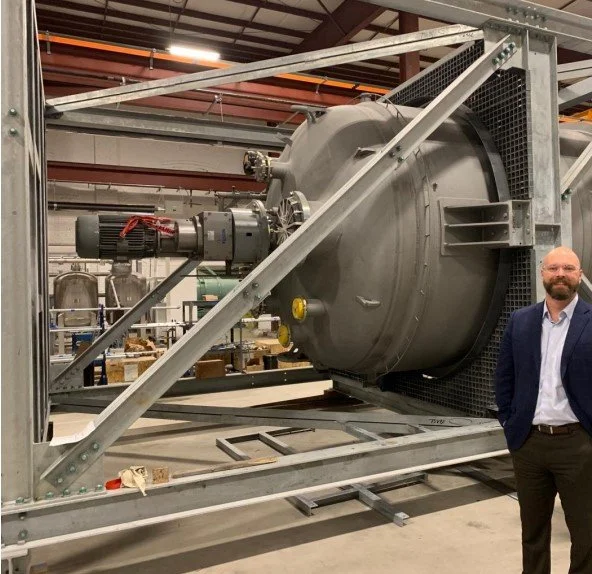Origin Materials
Company Name: Origin Materials
Headquarters: California, US
Ticker: ORGN listed on the NASDAQ since 2021
Year Founded: 2008
Category: Negative Emissions Technology / Carbon Capture & Utilisation
Profile from the Company: Origin Materials, Inc. is a carbon negative materials company. It has developed a platform for turning the carbon found in non-food biomass into useful materials, while capturing carbon in the process. It replaces petroleum-based materials with decarbonized materials in a range of end products, such as food and beverage packaging, clothing, textiles, plastics, car parts, carpeting, tires, adhesives, soil amendments and more. It has developed a platform technology to convert biomass, or plant-based carbon, into the building block chemicals chloromethyl furfural (CMF) and hydrothermal carbon (HTC), which are referred as furanic intermediates, as well as other minor products. Its technology converts sustainable feedstocks, such as sustainably harvested wood residues, agricultural waste, wood waste, and even corrugated cardboard into materials and products that are made from fossil feedstocks, such as petroleum and natural gas. These sustainable feedstocks are not used in food production.
Origin Materials through the Net-Zero Ninety Lens
Origin Materials was founded in 2008 by chemical students from the University of California, Davis, including Ryan Smith and the now Co-CEO John Bissel. Origin has developed a process to turn carbon containing biomass, such as wood, into useful materials like plastic, textiles, and additives. The company went public in June 2021, through a merger with Special Purpose Acquisition Company (SPAC) Artius Acquisition (founded by Charles Drucker, the former Worldpay C.E.O., and Boon Sim, the former global head of M.&A. at Credit Suisse.), listing on the Nasdaq stock exchange with a valuation of $1 billion and supported by existing and new investors, including Danone, Nestlé Waters, PepsiCo, Mitsubishi Gas Chemical, and AECI, Sylebra Capital, Senator Investment Group, Electron Capital Partners, BNP Paribas AM Energy Transition Fund, and affiliates of Apollo.
The company is led by Co-CEO’s John Bissel who founded the business, and Rich Riley, who is the former CEO of Shazam and was a senior executive at Yahoo! (Riley sold what is now the Yahoo toolbar to Yahoo in 1999). Origin has recruited an impressive senior leadership line-up with a depth of blue-chip experience through the value-chain, from the chemicals and energy industry to packaging, drinks, automotive, and healthcare.
Lean Green Economics
Origin takes wood or bio waste feedstock and produces high grade PET plastic used in packaging, textiles, and paints. They can also produce HTC activated carbon powders used in water treatment, tyre additives and agricultural products. Origin’s chemo-catalytic process uses off-the-shelf industrial equipment, established chemical processing, moderate temperatures, and cheap non-food carbon feedstock. The company estimates they can produce high grade, low-carbon or carbon-negative products which are substantially cheaper than sugar-based bio-plastics, and comparable, if not cheaper, than the oil-based equivalent.
Sustainable Scalability
The strength of Origin’s product proposition is the ability to transform cheap, wood-based feedstock into useful materials. The feedstock used in the Origin process will be fed by sustainably managed timber or waste biomass. As each tree is grown it will sequester carbon dioxide from the atmosphere, the wood is then chemically transformed by Origin’s patented chemo-catalytic process, and the carbon dioxide locked away in the plastic or additive end-product. A new tree can be re-planted and the sustainable, carbon-negative, carbon capture and utilization cycle can continue. In comparison, the current offering of bio-based plastics are manufactured using expensive, sugar-based feedstock from corn, sugarcane, or vegetables which compete with food production and are limited in scale-up potential.
Tree planting is a cheap, low risk solution to drawing CO2 from the atmosphere, and the Origin process supports a route towards sustainably harvesting and regrowing the trees to unlock greater carbon capture potential from any given area of forest. Drawing down just 15% of today’s GHG emissions through tree planting would create 3.5 billion tonnes of wood each year – it’s a good bet that sustainable timber will remain a cheap and plentiful feedstock.
A Boat for the Moat
Origin completed the build of their first commercial scale plant (Origin 1) in Q4 2022 and have secured financing for Origin 2, a world-scale manufacturing facility in Louisiana. Origin 2, scheduled for launch by 2025, will convert 1 million dry tonnes of sustainable wood residues into PET plastic and HTC activated carbon for a variety of end-markets. If Origin can successfully scale manufacturing, the company will have a drop-in, high-grade range of chemical products with negative carbon emissions and a comparable price point to the cheapest oil-based equivalents. Switching to Origin’s low carbon solutions should become a no-brainer for potential customers. Perhaps why the company has over $9 billion in offtake and capacity reservation agreements with partners such as Ford, Nestle, Pepsico, LVMH, Revlon, Mitsubishi, and Danone. Longer-term the total addressable market for PET and HTC products is $400 billion, and another $400 billion if you include the full range of chemistries Origin is planning post-2030.
Other Pure-Play Carbon Capture & Utilisation (CCU) Companies: Aemetis, Green Star Products, Alto Ingredients, Danimer Scientific, LanzaTech, CarbonFree, Carbon Built.
Category: Negative Emissions Technologies (NET) / Carbon Capture and Utilisation (CCU)
Negative Emissions Technologies (NET) refer to a group of climate engineering solutions that directly remove carbon dioxide (CO2) from the atmosphere. Negative Emissions Technologies range from low risk, low cost, but limited scale options like tree planting or enhanced rock weathering, to potentially large scale but high cost and uncertain options like direct air capture or ocean nutrition. Negative emissions strategies will certainly play a role in our response to climate change, helping to buy us more time and to limit the global temperature rise, but the mix of options and scale of deployment are still being decided. The future role for negative emissions technologies is still highly uncertain, but nature-based solutions such as tree planting, coastal management, and peatland restoration are low cost, low risk, and come with many co-benefits. Nature-based solutions could help to remove ~10 billion tonnes of CO2 (20% of current emissions) each year, other negative emissions technologies could support another ~2.5 billion tonnes (5% of current emissions) removal depending on the economics of deployment. The market for negative emissions capital equipment could be worth up to $100 billion per year, with the total market solution worth up to $500 billion in a net-zero future. Beyond just capturing and storing the CO2, Carbon Capture and Utilization (CCU) aims to add economic value to the sequestered carbon by producing saleable fuels or material products.
This content is for informational purposes only, you should not construe any such information or other material as legal, tax, investment, financial, or other advice. No renumeration, incentives, or otherwise have been received from the company. Full Legal Disclaimer


